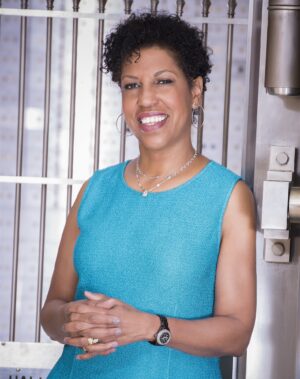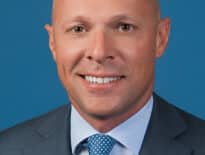Teri Williams
President and COO, OneUnited Bank
Industry experience: 28 years
For OneUnited Bank President and COO Teri Williams, closing the racial wealth gap is not about telling people to spend less money at Starbucks. Instead, a single transaction could affect the gap, she said, from buying a home to starting a business or investing in the stock market.
The largest black-owned bank in the U.S. with $667 million in assets, Boston-based OneUnited recently introduced a program aimed at closing the racial wealth gap based on this idea. BankBlack X provides customers with financial education and services, including a tap-to-pay Visa debit card, early payday and online financial literacy modules offering badges and rewards. The program also encourages understanding the history of black people and money. OneUnited has partnered with the SiriusXM radio for a town hall on Nov. 5 to discuss The New York Times 1619 Project, an examination of the 400th anniversary of slavery in the U.S.
Q: What is BankBlack X?
A: BankBlack X is an extension of the BankBlack movement, which was started in 2016 by the broader black community around the country, who were responding to violence that was being committed against black and Hispanic – but mainly black – individuals. The community was trying to identify what could be done, and one of the things that came out of that was a decision and desire to move money to black–owned banks. They see it as part progress to move their money to a black-owned bank such as OneUnited, but it is also part protest, where there is a concern that our money is being taken for granted or is not being respected and is not building wealth in the black community.
The additional part of BankBlackX is a focus on telling the true history and the true story of black people and money. One of the things we are realizing as a community is that a lot of the things that have been told about black people and money have not been true. It is difficult if you don’t understand the truth to really embrace financial literacy, to embrace better money decisions.
Q: What is that history?
A: We’re partnering with Sirius Radio to share information on The New York Times 1619 Project, where a lot more of the truth has been told about the history of wealth–building in the black community.
One example that hasn’t been effectively communicated in the broader community is that slaves were mortgaged. It wasn’t just that there was slavery and individuals were forced into unfree labor. But in addition to that – similar to how you would get a mortgage on a home today – slaveowners obtained mortgages on slaves and then used those funds to buy more slaves. Just as today people buy a home and mortgage their home and build wealth from that home ownership, people were building wealth from slave ownership.
Another example is a myth or a paradigm that’s shared and, to some degree, accepted in the broader community and in the black community that the difference between black and white wealth is that black people spend too much or are not good with their money. Whereas, the truth is there were a lot of public policies and practices that were put in place even after slavery – in fact for 150 years after slavery – that really impeded the ability of the black community to build wealth. That includes, of course, Jim Crow, but it also includes discrimination as it relates to mortgages, income and jobs. A lot of those things that were done were actually legal.
So when you talk about the truth of black people and money, you have to understand that black people in America have really only been legally free for about 50 years, since the Civil Rights Act was passed.
Q: What do you hope to achieve with the BankBlack X campaign?
A: We hope – and we’re already seeing – that the black community will start to make financial literacy a core value: being financially literate, knowing our history, but also knowing what we need to do from here. Recognizing that this wealth gap really for many people is one transaction: that buying a home could really close that wealth gap for a lot of people or investing in the stock market, saving more, taking advantage of where we are today. The history is important in that it helps people understand why we are where we are today, that tremendous progress has been made and that additional progress is possible.
Q: What has been the reaction to the campaign?
A: We’ve received a lot of positive reactions from our customers. They are very excited about the early pay. We’re using push notifications to alert them that their early pay has arrived, so that has been well received. From the broader campaign, financial literacy and telling the truth about our money has also been well–received. There was a question that our community posed: How does this close the racial wealth gap? If you think about it in your own family life, if you have no sense of the financial history of your family, no sense of the current condition of your family, it’s really hard to figure out how to move forward from there. As people start to understand the importance of the history and the truth, then people start to realize how this can help us fill in the gaps, for lack of a better term, and fill in the broader gap.
Q: What else could be done to close the racial wealth gap?
A: It’s going to take the broader community’s understanding and assistance, as well. I’m also chair of the Black Economic Council of Massachusetts, an organization that was created to improve the economic well–being of the black community in Massachusetts. Prior to BECMA coming into existence, there really wasn’t an organization that was specifically focused on the wealth gap and on what we could do. Since we formed this organization, we have been partnering with a wide range of organizations. Making people aware of the wealth gap and working with organizations to address it are things the broader community can work on with us.
Williams’ 5 Favorite Things:
- Current Book: “Talking to Strangers” by Malcolm Gladwell
- Exercise: Morning walks
- Online News: Washington Post, New York Times, The Root
- App: OneUnited Bank (of course)
- Airline: JetBlue




 |
| 


